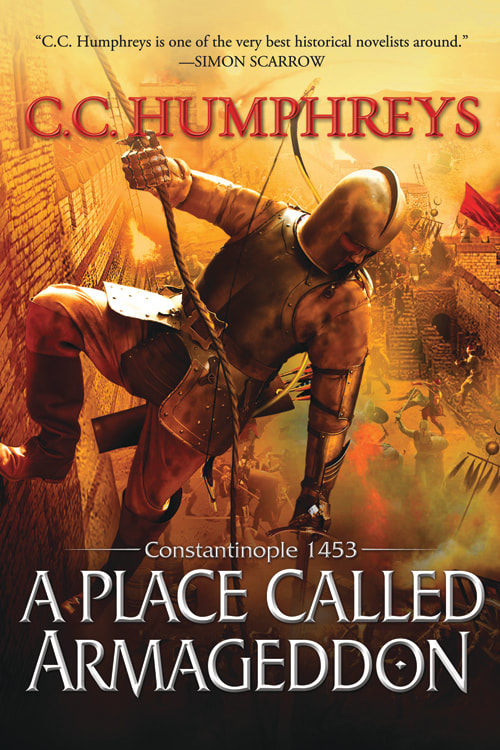A PLACE CALLED ARMAGEDDON
|
OPENING LINE: “We are coming, Greek.” To the Greeks who love it, it is Constantinople. To the Turks who covet it, the Red Apple. Safe behind its magnificent walls, the city was once the heart of the vast Byzantine empire. 1453. The empire has shrunk to what lies within those now-crumbling walls. A relic. Yet for one man, Constantinople is the stepping stone to destiny. Mehmet is twenty when he is annointed Sultan. Now, seeking Allah’s will and Man’s glory, he brings an army of one hundred thousand, outnumbering the defenders ten to one. He has also brings something new – the most frightening weapon the world has ever seen… But a city is more than stone, its fate inseparable from that of its people. Men like Gregoras, a mercenary and exile, returning to the hated place he once loved. Like his twin and betrayer, the subtle diplomat, Theon. Like Sofia, loved by two brothers but forced to make a desperate choice between them. And Leilah, a powerful mystic and assassin, seeking her own destiny in the flames. This is the tale of one of history’s greatest battles for one of the world’s most extraordinary places. This is the story of people, from peasant to emperor – with the city’s fate, and theirs, undecided… until the moment the Red Apple falls. |
REVIEWS:
Hot off the press Amazon review… and possibly the best:
‘Just for history and the plot alone, this book is worth reading. But if you read the book just for history and plot, you would be missing something – perhaps the best thing about the book. There are good books with hum-drum words and adequate stories. This book is written with prose. Every scene is crafted with an eye for pace, a feel for flow and an ear for rhythm, as if the stage actor in Chris was reading every word on a stage in one of London’s West End Theatres (where he once performed). The words are mesmerizing and beautiful and hand-crafted to be perfect in every syllable.’
Joe Beernink
Manda Scott on ‘Good Reads’.
“Gregoras is the archetypal wounded hero and he comes across as flawed, dangerous and immensely likeable, surrounded by a full, deep supporting cast which is one of this book’s great strengths: nobody is a cipher, no character fails to engage early and completely. In a world where historical novels are so often full of twentyfirst characters in drag, and even those are two dimensional, this book is so full of three-d, real people, it’s impossible not to want both sides to win. In the end, only one can, and it’s heart-breaking, tho’ I suspect it would have been just as bad had it gone the other way.
From a writing perspective, what’s so interesting about CC Humphreys’ style is that he switches viewpoint mid-scene on a regular basis. Few people attempt this and even fewer succeed in doing it smoothly. Humphreys does it with style and panache and it gives an interesting insight into some of the trickier encounters. It’s not something I’d imagine doing, but I’m impressed with it here…”
‘Just for history and the plot alone, this book is worth reading. But if you read the book just for history and plot, you would be missing something – perhaps the best thing about the book. There are good books with hum-drum words and adequate stories. This book is written with prose. Every scene is crafted with an eye for pace, a feel for flow and an ear for rhythm, as if the stage actor in Chris was reading every word on a stage in one of London’s West End Theatres (where he once performed). The words are mesmerizing and beautiful and hand-crafted to be perfect in every syllable.’
Joe Beernink
Manda Scott on ‘Good Reads’.
“Gregoras is the archetypal wounded hero and he comes across as flawed, dangerous and immensely likeable, surrounded by a full, deep supporting cast which is one of this book’s great strengths: nobody is a cipher, no character fails to engage early and completely. In a world where historical novels are so often full of twentyfirst characters in drag, and even those are two dimensional, this book is so full of three-d, real people, it’s impossible not to want both sides to win. In the end, only one can, and it’s heart-breaking, tho’ I suspect it would have been just as bad had it gone the other way.
From a writing perspective, what’s so interesting about CC Humphreys’ style is that he switches viewpoint mid-scene on a regular basis. Few people attempt this and even fewer succeed in doing it smoothly. Humphreys does it with style and panache and it gives an interesting insight into some of the trickier encounters. It’s not something I’d imagine doing, but I’m impressed with it here…”

